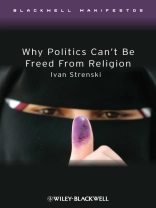Why Politics Can’t be Freed From Religion is an original,
erudite, and timely new book from Ivan Strenski. Itinterrogates the
central ideas and contexts behind religion, politics, and power,
proposing an alternative way in which we should think about these
issues in the twenty-first century.
* A timely and highly original contribution to debates about
religion, politics and power – and how historic and social
influences have prejudiced our understanding of these concepts
* Proposes a new theoretical framework to think about what these
ideas and institutions mean in today&’s society
* Applies this new perspective to a variety of real-world issues,
including insights into suicide bombers in the Middle East
* Includes radical critiques of the religious and political
perspectives of thinkers such as Talal Asad and Michel
Foucault
* Dislodges our conventional thinking about politics and
religion, and in doing so, helps make sense of the complexities of
our twenty-first century world
สารบัญ
Acknowledgments xi
1 When God Plays Politics: Radical Interrogations of
Religion, Power, and Politics 1
2 Interrogating ‘Religion’ 8
1. Religion Trouble 8
2. ‘Seeing’ Religion: Six Common Clichés 11
3. Gagging at the Feast of Two Unexamined Assumptions: Religion,
All Good or All Bad 14
4. The Religion-Is-No-Good Cliché 21
5. The Second Set of Two Clichés: Religion Is Belief and
Belief in God 24
6. ‘Religion’s’ Private Parts 33
7. Powerless in Paradise 35
8. Two Ways to Eliminate ‘Religion’ 36
9. Is Religion Our Phlogiston? An Historical Test Case 39
10. Talal Asad’s ‘Religion’ Trouble 42
11. The Trick of Defining ‘Religion’ 46
12. Owning ‘Religion’ 50
13. How Durkheim Took ‘Ownership’ of
‘Religion’ 55
14. Religion and Its Despisers 59
3 Interrogating ‘Power’ 62
1. Confronting the Paradox of ‘Power’ 62
2. How ‘Power’ Plays Havoc with Thinking about
‘Institutional Violence’ 66
3. Whom Should We Blame? ‘History’ on Trial 70
4. History’s Helper: We Should Also Blame Foucault 81
5. Problematizing Power in South Africa 84
6. Foucault versus Foucault 88
7. Thinking about Power as Auctoritas and Hierarchy 90
8. What More Is to Be Done? Thinking about Power as Auctoritas
and Social Force 97
4 Interrogating ‘Politics’ 100
1. Defining ‘Politics’ 100
2. Where There Is No Politics: Despotism and Totalitarianism
102
3. Autonomous Politics 105
4. Where Our ‘Politics’ Makes No Sense 107
5. Politics, the Construct 109
6. Two Pernicious Views of ‘Politics’ 112
7. History Lessons for Professor Morgenthau 116
8. What Constitutionalism Owes the Council of Constance 119
9. The Emergence of the Political . . . from the Religious
123
10. Machiavelli and Luther: Critical Contributions to the
Autonomy of Politics 125
11. Foucault’s Fault II: ‘Everything Is
Political’ 130
12. The Hidden Fascism of Thinking that Everything Is Political
133
13. Public and Private: No Absolute Line of Demarcation 135
14. Resisting the Panopticon 136
15. Afterword: The Autonomy of ‘Politics’ and the
Nation-State 140
5 Testing Interrogations of ‘Religion, ‘
‘Power, ‘ and ‘Politics’: Human Bombers and
the Authority of Sacrifice in the Middle East 142
1. Is ‘Suicide’ Bombing Religious? 142
2. Making Too Much of Religion in ‘Suicide’ Bombing:
‘Islamofascism’ 144
3. Dying to Make Too Little of Religion in ‘Suicide’
Bombing: Robert A. Pape 147
4. No Religion in ‘Suicide’ Bombing: Talal Asad
150
5. How Religion Helps Explain Human Bombing 153
6. Human Bombing Is ‘Catastrophe, ‘ but also a
‘Triumph’ of ‘Secular Immortality’ 155
7. Human Bombing = Jihad + Sacrifice 160
8. Sacrifice or Suicide? 164
9. But Do Any Muslims Really Think Human Bombers Are
‘Sacrifices’? 168
10. Sacrifice Makes Authority 175
11. How and Why Sacrifice Works: The Authority of Sacralization
176
12. How and Why Sacrifice Works: No Free Gifts 180
13. Concluding Remarks 182
References 187
Index 196
เกี่ยวกับผู้แต่ง
Ivan Strenski is Holstein Family and Community Distinguished Professor of Religious Studies at the University of California, Riverside. He is the author of numerous books, including: Contesting Sacrifice: Religion, Nationalism and Social Thought (2002); Theology and the First Theory of Sacrifice (2003); The New Durkheim: Essays on Philosophy, Religious Identity and the Politics of Knowledge (2006); Thinking About Religion: An Historical Introduction to Theories of Religion and Thinking About Religion: A Reader (both Wiley-Blackwell, 2006).







![ปกของ Brian Schrag & Julisa Rowe: Community Arts for God's Purposes [Chinese] 貼近神心意的社群藝術 ปกของ Brian Schrag & Julisa Rowe: Community Arts for God's Purposes [Chinese] 貼近神心意的社群藝術](https://static.worldofdigitals.com/thumb_webp/740/9781645083740.webp)




